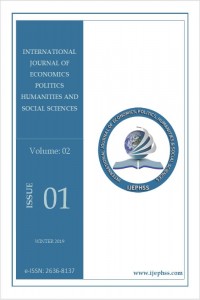STRUGGLES OF SECURITY AND SECULARISM IN TÜRKİYE AND ITS IMPACT ON GENDER ISSUES
Öz
The process of securitization reflects the
dominant security understanding and the forces that play on this security
understanding in a country. In Türkiye, this process of securitization is
experienced in close relation to militarization. With four military
interventions since the republic was established, two of which were full-scale
coups d’état. Türkiye has gone through an intensified process of militarization
that has affected the process of securitization. These processes are
constructed, but claimed to be “natural” for the securitization to work
smoothly.
This construction is based on a gendered
understanding and discourse especially with the way that the security agenda is
constituted, which helps for consolidation of the dominant security
understanding. With the effect of militarization on the process of
securitization, the security agenda is formed with the state as the sole
referent object, and this results in the individual security being taken for
granted. Furthermore, the state can also be a source of threat for individual
security within this relationship of securitization and militarization. The
militarized understanding of security and the close relationship between the
processes of securitization and militarization results in a hierarchical
attitude towards events and developments where individual security in general
and the security of women, in particular, are neglected. This paper analyzes
the relationship between the processes of securitization and militarization and
shows their gendered construction in Türkiye.
Anahtar Kelimeler
Kaynakça
- Referans1 Arat Yesim, 1989, The Patriarchal Paradox, London and Toronto: Associated University Press.
- Referans2 Birand, Mehmet A., 1986, The General's Coup in Türkiye: An Inside Story of 12 September 1980, London: Brassey's Defence Publishers.
- Referans3 Harris S. George, 1988, “The Role of the Military in Türkiye in the 1980s: Guardians or Decision Makers?” In State, Democracy, and the Military: Turkey in the 1980s (177–200).
- Referans4 Özbay Ferhunde, 1991, Women in modern Turkish society, 89-111, Zed Books, 1st edition, 1991.
- Referans5 Peterson V. Spike 1998,Gender & History ISSN 0953-5233,Feminism and International Relations gender & history Vol.10 No.3 November (581-589)
- Referans6 Tickner J.Ann 2001, “Gender, the Military, and War,” Stanford University, April 2001.
- Referans7 Tyler May Elaine 1988, Homeward Bound: American Families in the Cold War Era ,New York, Basic Books.
- Referans8 Wæver Ole, 1995, “Securitization and Desecuritization”, In Ronnie D. Lipschutz, ed., On Security, New York, Columbia University Press, 46-87.
- Referans9 William Hale 1994, Turkish Politics and Military, London and New York: Routledge.
- Referans10 Türkiye Istatistik Kurumu (2018), Number of representatives and representation rate in the Assembly by the election year and sex (1935 -2011), http://www.tuik.gov.tr/PreTablo.do?alt_id=1061
- Referans11 Türkiye Istatistik Kurumu (2018), Representation rate of women deputies in Turkish Parliament, (1935-2011) http://www.turkstat.gov.tr/PreTabloArama.do
STRUGGLES OF SECURITY AND SECULARISM IN TÜRKİYE AND ITS IMPACT ON GENDER ISSUES
Öz
The process of securitization reflects the
dominant security understanding, the forces that play on this security
understanding in a country. In Turkey the process of securitization is
experienced in close relation to militarization. Turkey has gone through an
intensified process of militarization that has affected the process of
securitization. These processes are constructed, but claimed to be “natural”
for the securitization to work smoothly. This construction is based on a
gendered understanding and discourse especially with the way that the security
agenda is constituted, that helps for consolidation of the dominant security
understanding. With the effect of militarization on the process of
securitization, security agenda is formed with the state as the sole referent
object, and this results in the individual security being taken for
granted. The state can also be a source
of threat for individual security within this relationship of securitization
and militarization. The militarized understanding of security and the close
relationship between the processes of securitization and militarization results
in a hierarchical attitude towards events, developments where individual
security in general and the security of women, in particular, are neglected.
This paper analyzes the relationship between the securitization and
militarization and shows their gendered construction in Turkey.
Anahtar Kelimeler
Kaynakça
- Referans1 Arat Yesim, 1989, The Patriarchal Paradox, London and Toronto: Associated University Press.
- Referans2 Birand, Mehmet A., 1986, The General's Coup in Türkiye: An Inside Story of 12 September 1980, London: Brassey's Defence Publishers.
- Referans3 Harris S. George, 1988, “The Role of the Military in Türkiye in the 1980s: Guardians or Decision Makers?” In State, Democracy, and the Military: Turkey in the 1980s (177–200).
- Referans4 Özbay Ferhunde, 1991, Women in modern Turkish society, 89-111, Zed Books, 1st edition, 1991.
- Referans5 Peterson V. Spike 1998,Gender & History ISSN 0953-5233,Feminism and International Relations gender & history Vol.10 No.3 November (581-589)
- Referans6 Tickner J.Ann 2001, “Gender, the Military, and War,” Stanford University, April 2001.
- Referans7 Tyler May Elaine 1988, Homeward Bound: American Families in the Cold War Era ,New York, Basic Books.
- Referans8 Wæver Ole, 1995, “Securitization and Desecuritization”, In Ronnie D. Lipschutz, ed., On Security, New York, Columbia University Press, 46-87.
- Referans9 William Hale 1994, Turkish Politics and Military, London and New York: Routledge.
- Referans10 Türkiye Istatistik Kurumu (2018), Number of representatives and representation rate in the Assembly by the election year and sex (1935 -2011), http://www.tuik.gov.tr/PreTablo.do?alt_id=1061
- Referans11 Türkiye Istatistik Kurumu (2018), Representation rate of women deputies in Turkish Parliament, (1935-2011) http://www.turkstat.gov.tr/PreTabloArama.do
Ayrıntılar
| Birincil Dil | İngilizce |
|---|---|
| Konular | Siyaset Bilimi |
| Bölüm | Makaleler |
| Yazarlar | |
| Yayımlanma Tarihi | 15 Ocak 2019 |
| Yayımlandığı Sayı | Yıl 2019 Cilt: 2 Sayı: 1 |
International Journal of Economics, Politics, Humanities & Social Sciences – IJEPHSS Creative Commons Atıf-GayriTicari 4.0 Uluslararası Lisansı (CC BY NC) ile lisanslanmıştır.


